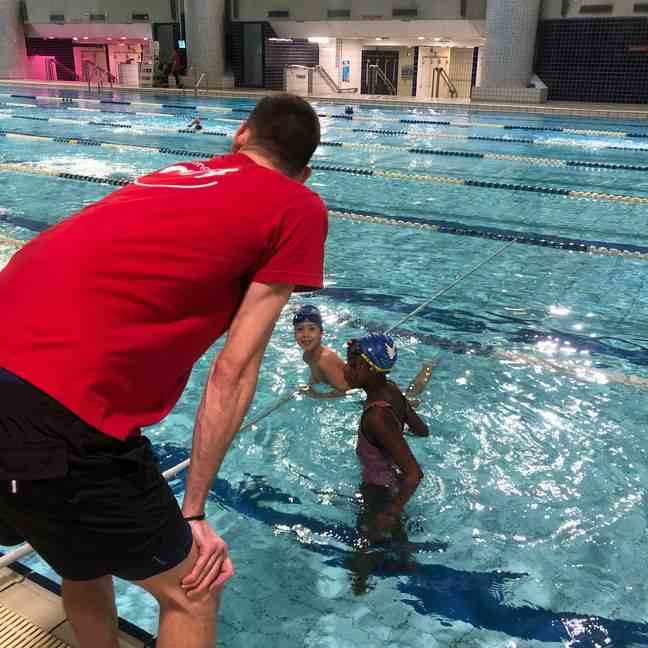Abdoul does not lead wide. This Tuesday, he will have to take the plunge, literally and figuratively, at the Suzanne Berlioux swimming pool in Paris. A major challenge for this 7-year-old boy who is not a big regular in the pools. Like him, about fifteen children, from the northern suburbs of Paris, put on their jerseys. They are preparing for their second swimming lesson, organized by the Secours populaire for the children of the families it accompanies in more than 80 Récréa aquatic centers in France.
“This is the 9th edition of our “Like a fish in water” operation, which has already benefited 4,000 children and is offered to 1,000 more this year. Because when you don’t have the means to make ends meet*, you cut corners on sporting activities,” explains Thierry Robert, national secretary of the Secours populaire français.
The initiative was born from an overwhelming observation: according to the French Swimming Federation, one in two children does not know how to swim when entering 6th grade. And the situation has worsened further in recent years, according to David Sueur, head of the aquatic center at Récréa: “Even if swimming lessons are compulsory in schools, many children have not had access to them during the health crisis. And others do not have access to a pool near their homes. »
“Children learn at their own pace”
Swimming goggles screwed on their heads, apprentice swimmers aged 6 to 12 enter the pool. Some throw themselves into the water without the slightest hesitation. For Abdoul and Adama, the operation is more delicate. “It’s cold,” whispers the little girl. And once in the water, you don’t feel more comfortable. They walk along the edge of the pool, clinging to the low wall to get used to the water. Abdoul, trembling lips, seems to hesitate: “I’m a little afraid to put my head under water,” he admits. He spends long minutes looking at the bar under which he has to pass, then starts, once but not twice.

“Children learn at their own pace. Yesterday, some did not even want to put their shoulders in the water. The most important thing is that they enjoy being in it,” comments Rodolphe, the lifeguard. Volunteers from the Secours Populaire who know the children accompanied by the association well also got into the water to reassure them.
“You will put your head under the pole”
Another lifeguard, Benjamin, takes care of the most comfortable group of children. “You will put your head under the pole, swim and try to catch the hoop at the bottom of the pool,” he asks his students for the day. Mariam, 10, says: “I already knew how to swim, but I didn’t often put my head under water. And since yesterday, I don’t do it anymore. Inssaf, 11, runs smoothly: “I learned to swim in CE2, but I don’t often go to the pool,” she says. “However, those who do not often swim tend to overestimate their skills and do not necessarily know how to swim for a long time and do the right movements”, comments Rodolphe. This can be seen in the pelvis, where several students make disorderly beats or fail to hold a length. “Having five sessions a week is more efficient than dispatching them throughout the month. Progress is faster,” says David Sueur.
After an hour of exercises, the children’s attention is a little less lively. The lifeguards therefore offer them a fun session. The fries are out, as is the waterslide. Laughter bursts out and everyone chooses their favorite game to let off steam. Benjamin has planned another way to relax them. “Come on, let’s do the starfish.” The children let themselves float. Before making the rocket in the water.
“They will have more self-confidence”
At the end of the session, Rodolphe rubs his hands: “The less adventurous got a little further from the edge, and I found that they had more fun than yesterday”. The children still have three sessions by the end of the week to acquire the basics of swimming, in order to become autonomous in a 25-meter pool. “This will enable them to eventually obtain the Nautical Pass or the Safe Swimming certificate,” explains David Sueur. “The very fact of having this activity during their holidays will mark their start of the school year. Because they will feel more at ease, will have more self-confidence,” believes Thierry Robert.
And so that everyone can take advantage of the lessons learned from the course, free entries to the swimming pool will be given to them. “Tomorrow, are we going to do courses? asks Abdoul. His fear is visibly gone. And he can’t wait to start again.

